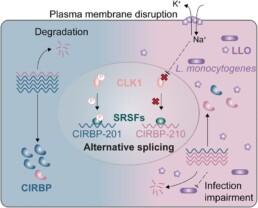Alternative splicing in response to Listeria infection
13 December 2023
A team from ENS Paris with the help from GenomiqueENS platform studied the response and the reorganization of gene expression in cells due to the introduction of bacteria.
They combined long- and short-read transcriptomic analyses of the response of intestinal epithelial cells to infection by the foodborne pathogen Listeria monocytogenes to gain isoform-level resolution of these modes of regulation.
Among the most striking isoform-based types of regulation, they discovered that expression of a stress response regulator and of several splicing factors switched from canonical transcripts to nonsense-mediated decay-sensitive isoforms by inclusion of ‘poison exons’.
Their findings are published in Nucleic Acids Research (Link to the paper)


